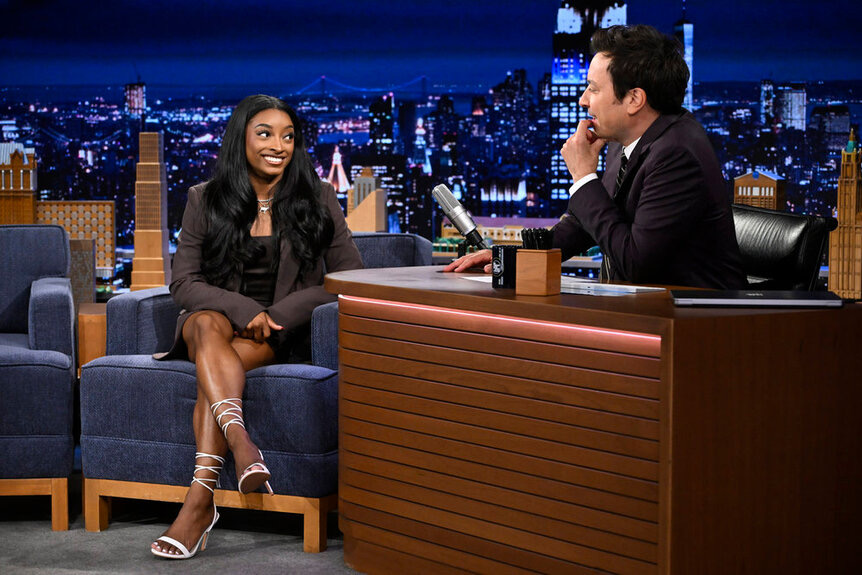Simone Biles, the most decorated gymnast in the history of the sport, has faced the world’s spotlight, not only for her unparalleled skills but also for her personal battles and the high expectations that come with being a legend. As she eyes another Olympic run at the 2024 Paris Games, one controversial question looms large: Is 27 too old for a gymnast?
Pushing the Limits of Age in Gymnastics
Gymnastics is an unforgiving sport. It demands peak physical fitness, flexibility, and an ability to defy gravity, all of which are qualities often associated with youth. The sport has long been dominated by teenage phenoms, with most gymnasts reaching their prime in their late teens to early twenties. By the time they hit their mid-20s, many gymnasts are already retired, moving on to coaching or finding new careers outside the gym.
At 27, Simone Biles would be an outlier at the Paris Olympics. Gymnastics is notorious for its short career span; gymnasts’ bodies endure extreme physical stress, and injuries are common. It is rare for gymnasts to continue competing at an elite level past their early 20s. The rigorous training, high-impact landings, and relentless pressure to perform take a toll on the body, making Biles’ potential participation a bold statement against the sport’s unwritten rules about age.
The Physical Toll: A Question of Sustainability
The physical demands on a gymnast’s body are brutal, especially for someone pushing 30. Biles has already dealt with numerous injuries throughout her career, including her highly publicized battle with “the twisties” during the Tokyo Olympics, a disorienting condition that can be dangerous in high-level gymnastics. These aren’t minor setbacks; they are warnings that the body is struggling to keep up with the sport’s demands. At 27, every flip, twist, and landing carries an increased risk of injury, not just due to age but also because of the wear and tear accumulated over years of elite competition.
In addition to the physical risks, there’s the reality of slower recovery times. Younger athletes can often bounce back from grueling training sessions and injuries quicker, but as athletes age, recovery becomes longer and more complex. For Biles, pushing her body to the limit might not just impact her performance but could also have long-term consequences on her health.
Age Brings Experience – But Is It Enough?
There’s no denying that Biles’ experience is invaluable. Her wisdom, composure under pressure, and mental fortitude set her apart from younger competitors. She knows how to navigate the Olympic stage, handle media scrutiny, and perform under the weight of global expectations. However, in a sport where milliseconds and minuscule errors can separate gold from nothing, experience alone may not suffice.
Biles’ skills are still awe-inspiring, but gymnastics is constantly evolving, and younger athletes are bringing new levels of difficulty to routines. Staying competitive at 27 means not just maintaining her current level but pushing it even further, a task that would be challenging even for an athlete at the peak of youth.
The Emotional and Psychological Weight
Beyond the physical challenges, Biles will also face immense emotional and psychological pressures. Her decision to withdraw from several events in Tokyo was a bold and necessary stance on mental health in sports, but it also raised questions about the psychological toll of competing at this level, especially as an older athlete in a sport dominated by youth.
Training for another Olympics is a massive commitment. It’s not just about the physical effort but the mental strain of constantly being judged, scrutinized, and compared to her past performances. For Biles, who has already given so much to the sport, the emotional weight of this journey could be even heavier than before.
A Defiant Return or a Step Too Far?
Simone Biles’ possible return at 27 could either be seen as a triumphant stand against ageism in sports or a stubborn refusal to let go of past glory. Her legacy as the greatest gymnast of all time is already secure, but her decision to compete again invites questions: Is it worth risking her health and legacy to prove a point? Can she redefine what it means to be a gymnast in her late twenties, or will this be a final chapter that highlights the harsh realities of aging in elite sports?
While fans eagerly anticipate seeing Biles compete once more, the reality remains: 27 is not young in gymnastics. As she prepares for Paris, Biles isn’t just fighting for medals; she’s fighting time, her own body, and the sport’s entrenched norms. Whether she succeeds or falters, her journey will be a defining moment—not just for her, but for the sport of gymnastics itself.
